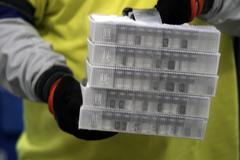As many as 71 percent of doctors encounter disinformation in their work at least once a week, while 38 percent has to deal with them every day.
At the same time, 60 percent of doctors consider health disinformation to be a serious problem, as they decrease trust in doctors or make patients oppose them during consultations. As much as 35 percent of doctors said that disinformation makes patients reject treatment or a doctor's recommendation, while 41 percent said they make patients reject vaccination.
This stems from a survey carried out by the Behavioural and Experimental Economy Team (beet) of the Health Ministry attended by 1,974 doctors in September 2020, focused on their perception of disinformation on health, how often they encounter them and how they impact the behaviour of their patients.
“This survey suggests that disinformation can threaten people’s health,” said Health Minister Marek Krajčí (OĽaNO).

He also referred to several media reports about patients who rejected a cancer treatment and opted for an alternative cure instead. In many cases, these did not end well.
Support for vaccination
Doctors often hear from their patients various untruths, speculations and conspiracy theories. Most disinformation the surveyed doctors encounter pertains to vaccination (72 percent) and the coronavirus (59 percent).
Fake news about vaccination is often linked to the fear from undesirable effects and the harm it can cause, as well as questions about the development of a vaccine against COVID-19. At the same time, disinformation about the pandemic mostly concerns its origin, seriousness of the disease, untrue statistics on infected people and the deceased, and risks related to wearing masks.
As much as 72 percent of doctors said they would get vaccinated against COVID-19, while 15 percent would not and 13 percent could not decide. The decision to reject vaccination is particularly visible in the case of doctors who consider the conspiracy Zem a Vek website a reliable information source.
As many as 60 percent said they would agree with mandatory vaccination, while 22 percent would support mandatory nationwide vaccination and 38 percent the mandatory vaccination of risky groups. The most frequent argument to back this decision was collective immunity.

Traditional media trustworthy
Doctors also said they consider media outlets like the Aktuality.sk news website (54 percent), the Hospodárske Noviny daily (35 percent) and the Sme daily (34.5 percent) the most trustworthy sources of information.
On the other hand, they do not much trust the tabloid outlets like the Plus Jeden Deň daily (3 percent), the Nový Čas daily (4 percent) and the Topky.sk website (4 percent), or the conspiracy Zem a Vek website (3 percent).
Although many respondents considered the Hlavné Správy website, which is known for spreading hoaxes, a trustworthy source, the authors of the survey later found out that many confused it with the main news coverage programmes on television.

“Doctors have confirmed that disinformation in the health sector is a widespread and serious problem that impacts the behaviour of patients,” said Jakub Goda, member of the beet team that fights disinformation at the ministry. “It’s a signal that we not only need to continue in our activities, but also add some extra effort.”
One of the main recommendations of the survey is to prepare a media campaign that would be shared on social networks, on television, radio, also leaflets, as well as ambassadors who would inform about the campaign through their own communication channels.

